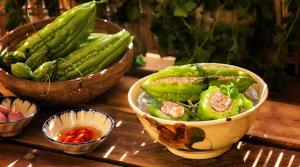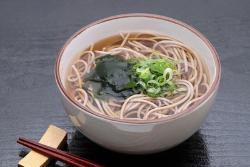Lan, tell us about your cultural experiences! January 2022 Issue
更新日:2022年4月27日
Traditional dish on New Year’s Eve
How was your New Year’s holiday? New Year in Vietnam is based on a lunisolar calendar which differs every year. For example, Lunar New Year’s Eve and Lunar New Year’s Day are January 31st and February 1st this year.
Vietnamese people call Lunar New Year “Tet”. Tet is the most important celebration in Vietnamese culture. Today, I would like to tell you about a traditional New Year’s Eve dish from the southern area of Vietnam, where I lived for almost 10 years.
This dish is bitter melon soup. The Vietnamese name for “bitter melon” is “kho qua”, in which “kho” means “difficulty and suffering”, “qua” means “to go away”. On New Year’s Eve, people eat stuffed bitter melon soup in the hopes that all difficulties from last year will go away and a new year full of joy and happiness will come.
In Japan, people eat toshikoshi soba (year-crossing noodle) on New Year’s Eve. It is believed that soba, which is made from buckwheat, symbolizes a long life due to its long shape.
Although the dishes are different, both Vietnamese and Japanese people have a tradition of eating food believed to be auspicious on the evening of the old year passing and the new year arriving.
It is interesting to know the cultural backgrounds and origins of other countries!

Stuffed bitter melon soup/肉詰めゴーヤスープ

Year-crossing noodle/年越しそば
大晦日の料理
皆さん、お正月はいかが過ごされましたか。ベトナムのお正月は旧暦ですから、毎年少しずつ時期が変わります。今年は1月31日が大晦日で、2月1日がお正月です。
ベトナムの旧正月は「テト」と言い、1年で最も大切な祝祭日です。今日はベトナムの南部の人が大晦日によく食べる料理を紹介したいと思います。
それは「ゴーヤ(にがうり)」です。「ゴーヤ」はベトナム語で「kho qua(コー・クァ)」と言い、同音語として「苦が過ぎる」という意味もあります。そういう意味で、南部の人は今年の苦しいことが過ぎて、良い新年を迎えられるようにと願いながら、大晦日に肉詰めゴーヤの煮込みを食べます。
日本人は大晦日に年越し蕎麦を食べて、蕎麦のように、細く長く生きられるようにと願いますね。方法は様々ですが、年が明ける大晦日にはベトナム人も日本人も縁起が良いと思われる料理を食べる習慣がありますね。
国々の文化の背景や由来を知るのは面白い!
Click to see the full catalogue of Lan's columns コラムの一覧へ


